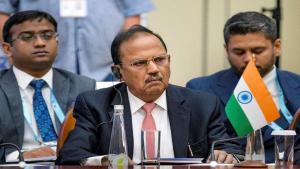
INDIA’S ROLE IN UKRAINE PEACE TALKS: DOVAL’S HIGH-STAKES MEETING WITH RUSSIA COULD END THE WAR
In a significant diplomatic engagement, India’s National Security Advisor (NSA) Ajit Doval held crucial talks with Russia’s Secretary of Security Council, Sergey Shoigu, on the sidelines of the BRICS summit in St. Petersburg. The meeting, described by the Indian embassy on X as a discussion on “important issues of mutual interest,” underscores India’s increasing involvement in potential peace negotiations between Russia and Ukraine amid growing international pressure for a resolution to the ongoing conflict.
Doval’s meeting with Shoigu came just two weeks after Prime Minister Narendra Modi’s pivotal visit to Kyiv, where he held talks with Ukrainian President Volodymyr Zelenskyy. During the meeting, Modi emphasized that both Russia and Ukraine should “sit together without wasting time” to bring an end to the war, offering India’s readiness to play an “active role” in the peace process.
With leaders from around the world, including Italy’s Prime Minister Giorgia Meloni and Russia’s President Vladimir Putin, urging India and China to step up as mediators, Doval’s presence in Russia signals a shift toward India taking a more prominent role in international peace diplomacy.
High-Stakes Talks with Russia
On September 11, Doval and Shoigu meeting was part of a broader dialogue held during the BRICS NSA conclave, where leaders from Brazil, Russia, India, China, and South Africa gathered to discuss global security challenges. The Russian Embassy in India lauded the meeting, highlighting the “multi-level trust-based political dialogue between Russia and India,” and reaffirming the “like-minded” partnership between the two nations.
Shoigu was quick to underscore the importance of India as a diplomatic partner, stating that “New Delhi is one of Moscow’s main like-minded partners in the world arena, whose friendship has confidently stood the test of time.” The statement reinforces the historic ties between the two nations, even as geopolitical tensions escalate in Europe.
While the specifics of their conversation were kept under wraps, it’s understood that the ongoing war in Ukraine and the possibility of peace negotiations were central topics of discussion. India’s delicate balancing act between Russia, a traditional ally, and Ukraine, with whom ties have strengthened recently, makes it a unique potential mediator in the conflict.
A Push for Peace Talks
Doval’s visit to Russia follows a string of high-level diplomatic engagements aimed at positioning India as a peace broker. Modi’s nine-hour trip to Kyiv was the first visit by an Indian prime minister to Ukraine since its independence in 1991. During this visit, Modi made it clear that India has been “on the side of peace” since the beginning of the conflict. He reiterated that India was “ever ready” to play an active role in resolving the crisis, a sentiment that Zelenskyy welcomed, despite some initial skepticism from Ukrainian officials.
Russian President Putin has also recognized India’s potential role in the peace process. Speaking at the Eastern Economic Forum in Vladivostok, he named India, Brazil, and China as possible mediators in the Ukraine conflict. “I am in contact with my partners, and I have no doubt that the leaders of these countries will be really interested and provide a helping hand,” Putin said, acknowledging the trust and confidence he has in these nations to facilitate dialogue.
India’s Diplomatic Balancing Act
India’s careful diplomacy has allowed it to maintain good relations with both Russia and Ukraine. External Affairs Minister S Jaishankar has repeatedly underscored that India believes the conflict “will not be resolved on the battlefield.” Instead, Jaishankar emphasized, “At some stage, there’s going to be negotiation. When there is negotiation, the main parties—Russia and Ukraine—have to be at that table. If you want advice, we are always willing to give it.”
This practical approach has placed India in a unique position to act as a neutral mediator. Modi’s strong personal relationships with both Putin and Zelenskyy have further boosted India’s diplomatic credibility. Modi’s earlier visit to Moscow for talks with Putin, coupled with his recent Kyiv visit, reflects New Delhi’s deep involvement in efforts to bridge the divide between the warring nations.
BRICS Summit: A Global Stage for Diplomacy
Doval’s presence at the BRICS summit, alongside top officials from China, Brazil, and South Africa, further highlights India’s growing role in global diplomacy. During the summit, Doval called for an “urgent need to reform multilateralism,” signaling that international organizations like the United Nations need to be more responsive to modern challenges.
The summit itself became a platform for discussing the Ukraine war, with Chinese NSA Wang Yi expressing China’s desire to “deepen mutual trust” among BRICS nations and play a role in shaping the global security landscape. Both Doval and Wang Yi, as special representatives in boundary talks between India and China, bring added significance to their presence at the summit, signalling how BRICS might influence future diplomatic efforts.
India’s increasing diplomatic efforts, particularly through the BRICS platform, have not gone unnoticed. With Putin and other world leaders calling on India and China to play a larger role, Doval’s discussions in St. Petersburg may mark the beginning of a broader international effort to end the suffering caused by the war in Ukraine.
2024-09-12T10:56:09Z dg43tfdfdgfd